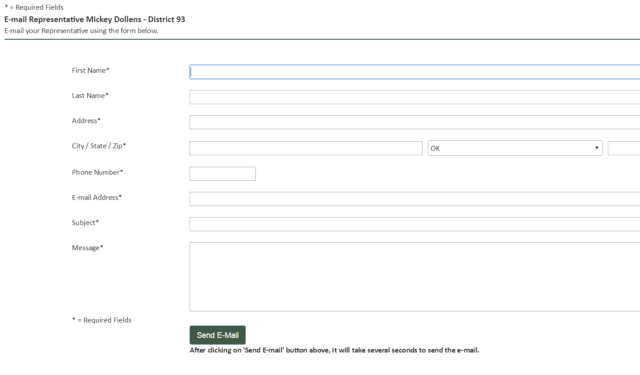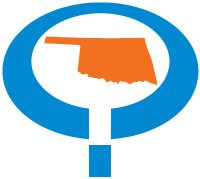
(Editor’s note: This story was authored by Mollie Bryant of Oklahoma Watch and appears here in accordance with the non-profit journalism organization’s republishing terms.)
A change to the Oklahoma House website removed legislators’ public email addresses and replaced them with a contact form that some critics believe will restrict access to lawmakers.
The House replaced public emails with an online form (see above) that require senders to disclose their first and last names, address and telephone number – information that previously wasn’t required to email lawmakers.
Some House members say the form is needed to limit mass and spam emails and help highlight messages from their own constituents. Others questioned whether requiring personal information in order to email a state representative would discourage emails from even constituents.
House spokesman: Spam integral to change
Jason Sutton, a spokesman for House Speaker Charles McCall (R-Atoka), said the House transitioned to the form in an effort to reduce spam.
“This idea that lawmakers are trying to prevent constituents from contacting them is absolutely absurd,” Sutton said. “We get emails from constituents all the time. Nobody has done anything up here to prevent constituents from contacting lawmakers.”
Tyler Johnson, an associate professor of political science at the University of Oklahoma, expects the form to have a limited impact.
“I feel like this is a step that is going to keep some people from wanting to send that message, but if the message is that important to you, I feel like you’d be willing to jump through these (hoops),” he said.
MORE INFO
Click here for Oklahoma Watch’s list of #okleg email addresses
The Tulsa World recently reported that the House also had blocked external emails sent to representative@okhouse.gov, which Sutton said was intended for internal communications to all members and staff. According to the World, the email address was posted online. After members received a particular email that was critical of lawmakers, the House decided to restrict who could send email to the address.
“It had absolutely zero to do with the contents of the email,” Sutton told Oklahoma Watch. “That email in question was pretty tame compared to what lawmakers get on a daily basis.”
Minority leader opposes form
Minority Leader Scott Inman (D-Del City) opposes the new system and said his office has received calls and emails asking where to find individual representatives’ email addresses since system went into effect about six months ago.
“Any additional barrier to access is counterproductive to constituent engagement and communication,” he said.
Inman also disagrees with using a system that removes Oklahomans’ ability to contact multiple House members at once.
“Now it eliminates that ability, and it only serves as another barrier for the citizens to contact their elected officials,” Inman said.
Inman also wrote a letter to McCall on March 31 asking that the representative@okhouse.gov address again allow external emails. He said he believes the decision was made after House members received a number of emails in support of the House Democrats’ revenue plan. Several lawmakers had provided the address to constituents who had asked how to email every member of the House without having to use the contact forms or copy and paste in each of their addresses, Inman said.
“Trying to silence voters and the will of the public for the political comfort of the majority party is really unacceptable,” Inman said.
‘Lots of emails’
Six emails provided to Oklahoma Watch and sent to the address on March 29 expressed support for the Democrats’ revenue proposal, with “Restore Oklahoma” in the subject lines. At about 1 p.m., a legislative assistant for Rep. Randy McDaniel (R-Edmond) wrote in an email to other legislative assistants with the same subject line: “Lots of emails. Does someone know what this is??”
Within two hours, the address began blocking messages from the public, according to emails pointing out the issue.
But Sutton insists the decision was not made because of what was in those emails, either, rather to protect the address for its intended purpose.
“The members are happy to hear from people with different perspectives,” he said, adding, “They’re grown-ups. They can take it.”
‘Not enough time in the day’
With a limited staff, some lawmakers say they are unable to respond to emails from people who aren’t their constituents.
Majority Floor Leader Jon Echols (R-Oklahoma City) said he doesn’t oppose listing his email address online. Although he was unfamiliar with the form system, he appreciated that it requires an address.
“Because of the volume of emails, if I get an email and it doesn’t have an address, then I assume that’s not a constituent, and I don’t respond to non-constituent emails, because I can’t do it,” Echols said. “There’s just physically not enough time in the day.”
Similarly, Rep. Jason Murphey (R-Guthrie) said he now can easily distinguish out-of-state email blasts sent to many lawmakers from constituent emails sent to a single House member via the form. That makes the forms beneficial, he said, as mass emails from automated systems have spiked in recent years. Now he receives fewer blast emails, he said.
“That’s pretty powerful, because it stands out and potentially gives lawmakers a much stronger, precise ability to distinguish their constituents’ correspondence from out-of-state correspondence,” Murphey said.
Inman acknowledged that the form helps representatives tell which emails are from constituents, but he said he does respond to Oklahomans who don’t live within his district.
“If a representative votes to cut education funding, it doesn’t just affect the children and parents in their district. It is detrimental to kids across the entire state,” he said.
Echols and Murphey both said they save information from the contact forms to keep up with their constituents. They don’t sell the information or use it for other purposes. Inman expressed concerns that the information could be used to micro-target people based on their interests in particular issues.
Senate still lists individual email addresses
Meanwhile, the Senate’s site still lists its members’ emails, and there don’t appear to be plans to move to the form. Sen. David Holt (R-Oklahoma City) said even if the Senate adopted the contact forms, he’d insist on leaving his email up.
“I want my email address to be publicly available,” Holt said. “… It’s just easier that way, and people have more confidence they’re communicating directly with that person.”






















